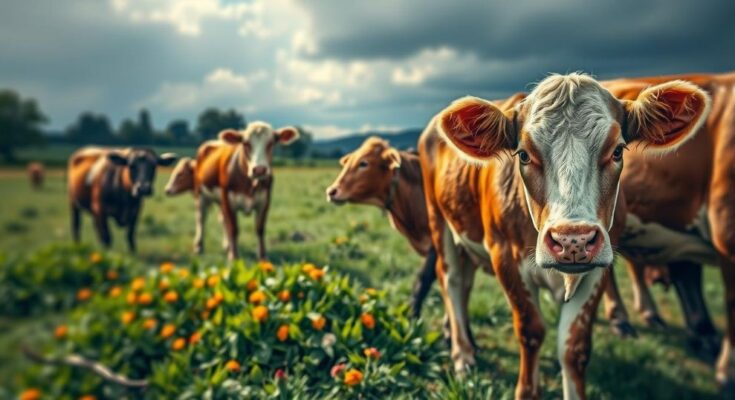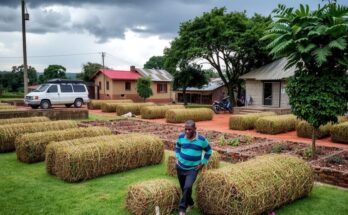The article highlights the vital role of livestock in Africa’s agricultural systems, emphasizing their contribution to food security, livelihoods, and biodiversity. It argues against the notion that livestock are merely environmental liabilities, advocating for their recognition in climate policies and sustainable management practices to enhance resilience in vulnerable communities. It calls for a shift in funding priorities to support sustainable livestock systems that can aid climate action and land restoration while sustaining rural economies.
Climate policies should recognize the integral role of livestock in achieving sustainable agricultural systems and combating climate change. Contrary to a common perception that classifies livestock primarily as environmental liabilities, a more comprehensive analysis reveals that when managed sustainably, livestock can actively contribute to climate resilience and support the livelihoods of vulnerable communities. With approximately 400 million cattle in Africa, the livestock sector represents a critical segment of the continent’s agricultural economy, accounting for 30 to 40 percent of total agricultural gross domestic product. Livestock provide essential nutrition through meat, milk, and eggs, thereby combatting malnutrition, and serve as a dependable source of income amidst limited alternatives. In the context of major global conferences such as COP29 to address climate change, it is essential to shift perspectives about the livestock sector and leverage its potential benefits. When engaged through responsible management, livestock can serve as vital agents for biodiversity conservation and ecosystem health. Sustainable grazing practices are known to foster the regeneration of native plant species and help maintain ecological balance. Traditional pastoralist practices, seen in communities such as the Maasai in Kenya, illustrate the symbiotic relationship between livestock management and biodiversity enhancement, producing nearly 20 percent of the nation’s milk while preserving natural habitats. Furthermore, the role of livestock in climate action extends beyond methane emissions, which often dominate discussions surrounding ruminants such as cattle. Enhanced rangeland management and climate-smart feeding practices are instrumental in minimizing greenhouse gas emissions. Furthermore, by transforming grazing lands into vibrant carbon sinks, sustainable livestock systems can significantly contribute to climate mitigation, holding the potential to sequester substantial carbon emissions by 2050. Adaptability is another critical attribute of livestock systems, especially in regions vulnerable to climate change effects. Pastoralists employ strategies of adaptive mobility, relocating livestock in response to changing rainfall patterns, thereby optimizing resource use and enhancing resilience against drought and climate variability. In arid and semi-arid areas such as Kenya, indigenous livestock breeds are tailored to withstand harsh climates, proving indispensable for survival and economic stability. As global land degradation poses significant challenges, sustainable livestock management emerges as a strategic tool for preventing further ecosystem decline while restoring degraded landscapes. Through practices such as rotational grazing, landscape regeneration and soil health can be promoted, reinforcing food security and fostering rural economic stability. It is imperative, therefore, to reassess the funding mechanisms relating to livestock systems, as international climate finance continues to neglect this sector. By recognizing the multifaceted contributions of livestock to climate solutions, food security, and economic growth, policymakers can support strategies that empower livestock-keeping communities, rather than viewing them as adversaries in environmental discussions. The effective integration of livestock into climate strategies signifies a pragmatic approach to addressing both environmental and societal challenges, particularly in contexts like Africa where animal husbandry is woven into the fabric of daily life. In conclusion, livestock should not be dismissed in climate policies, as they embody a significant opportunity for sustainable food systems and resilience against climate change. The discourse surrounding livestock must evolve to embrace their potential benefits, ensuring that concerted efforts are made to finance sustainable practices within the sector. Recognizing livestock as legitimate actors in climate action is essential for fostering inclusive and effective solutions to the pressing environmental issues facing the world today.
The article discusses the crucial role of livestock in Africa, particularly in relation to climate policies and sustainable agriculture. Despite facing scrutiny for their environmental impact, livestock are integral to food security, rural livelihoods, and biodiversity conservation. The context of major international climate discussions underscores the need for a paradigm shift in perceiving livestock, focusing instead on their potential contributions to climate action and resilience amidst growing environmental challenges.
Livestock are indispensable for sustainable agricultural practices and climate resilience, particularly in regions like Africa. Policymakers must shift perspectives to recognize livestock as valuable assets rather than liabilities, integrating them into climate strategies. With appropriate funding and sustainable practices, livestock can contribute positively to biodiversity conservation, food security, and climate mitigation, ultimately supporting rural livelihoods and promoting ecosystem health.
Original Source: www.aljazeera.com




